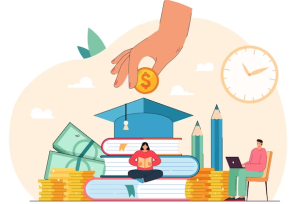Now, student loans are a serious problem for a number of young people in America; they affect their financial situation and much more. This skyrocketing debt can influence things like the occupation one is exploited to, the number of children one might want to bring to the world, among other things.
To the debtor nations and particularly the much younger generation in the U. S, let me now discuss some of the impacts of this financial burden that has been placed on them as a result of overstaying their welcome in this world.
They are far-reaching and complex, concerning not only the person’s purse but also his or her state of mind. In this writing, we will discuss some of the essential domains affected by the educational debt, discussing its implications in the social and economic realms.
The financial strain of educational debt

This is sure to put a lot of financial pressure on those graduates who owe a lot of money after the college. Huge amounts of money are spent on repaying loans, meaning this becomes a top most priority for many graduates at the expense of other important goals such as saving for retirement or to buy a house.
This trend of financial planning may cause stagnation of crucial events in the life blueprint, with the negative result on long-term financial status. Moreover, the interest rates on such borrowings may be fairly high; this has proven a problem in managing the outstanding principal.
The end product is a lasting debt that can run up to the middle age and beyond. Such an extension of financial liabilities reduces the discretionary income for current and future expenditures. As a result, managing these monetary obligations transforms into a challenge for young people, meaning that the expenditures entail a person to make some sacrifices and control the spending in order to meet the monthly obligations.
Such pressures translate into the need to produce and meet such obligations possibly towards the family which in turn causes a progression of mental health problems making this situation even more complicated.
Career choices and student loans
The young adults’ career decision is still shaped by debts from educational undertakings. From time to time, graduates may feel forced to take up well paying jobs which do not interest them or for which they are not trained for. This aspect may cause dissatisfaction in the job as well as blunt the morale of the workers in the long run.
Also, to reduce the loan amount more quickly, many choose occupations that bring higher payback to avoid fulfilling and promote themselves quickly. They may also avoid venturing on the unknown territory of entrepreneurship to start their own businesses because starting a business requires money which most people do not have, this chains their potential and slows down innovation.
Therefore, the burden of repaying such borrowings hinders mobility and self-employment, thus reducing general organizational endorsement and productivity in the long-run. Emphasizing the role of high income over passion and passion-based careers underscores the powerful effect of obligations likelihood on career progression.
Impact on personal life and mental health
The responsibility of educational debt is deeper than the pressure of the amount owed, and it affects students’ health. Stress from high debt can lead to cases like depression and chronic stresses, mainly because of the pressure that accompanies the high levels of debt. These tension can manifest in day to day life and one’s performance at work, hence leading to a continuous pressure.
However, and possibly the most significant impact is that relationships may strain due to financial hardships. With regard to conflict, financial issues are positively related to conflicts, which decreases the quality of romantic partnership as well as strains familial relationships. A feeling of being caught up with debt also extends existence milestones which include marriage and having children because one feels they are financially insecure.
Therefore, it can be concluded that effects of student loans do not only have economic impact, but are the areas, which are emotional and social as well. These loans then become important to resolve not only in the financial area but also in the spheres of well-being and health.
Paving the path towards financial freedom
Although having educational debt brings a set of problems, it isn’t without solution strategies with which it can be dealt. A generation of loan aware youths can be created through provision of financial literacy programs that prepare young adults on how to handle their loans responsibly. It is however relieved by government policies as well as employer assistance programs to some extent.
Tools like repayment plans that allow the movement of the monthly payment to the income level are more feasible not to mention easy in terms of balancing between paying for the loans and other needs. Thus, enhancing the knowledge of Graduates about the probable loan forgiveness can protect them from accumulating the debt for a longer period.
